
28 minute read
Meet the six professionals striving to improve life on the North Shore, earning them a spot this year in the North Shore Chamber’s Academy of Distinguished Leaders. Page
Mike Dean photos
RAISING THE BAR
Advertisement
THE CHAMBER’S 2021 DISTINGUISHED LEADERS BRING PRESTIGE TO THE NORTH SHORE
They hail from varied backgrounds.
They dedicate themselves to diverse fields and causes.
Yet, this year’s class of North Shore Chamber Distinguished Leaders share a commonality of being role models and mentors, setting a lofty example for others to strive for.
The Distinguished Leader Award was created 10 years ago by John Hall, the past chairman of the Chamber’s Board of Directors, to recognize professionals who are making a significant impact on the North Shore through their leadership, creativity, innovation and proven economic and social impact.
Since 2011, almost 60 professionals representing a range of industries and sectors have been inducted into the Chamber’s Academy of Distinguished Leaders.
They are joined this year by six new honorees, who were honored at The Chamber’s Annual Dinner Meeting in November at Danversport.
They are: Jonathan Blodgett, Essex District Attorney Robyn Burns, executive director of The Salem Pantry Dennis Cataldo, president and CEO of Cataldo Ambulance Service Inc. Mary Anne Clancy, senior vice president of marketing and communications for the Institution for Savings John Keenan, president of Salem State University James Rudolph, founder and managing partner of
Rudolph Friedmann LLP
A recurring thread is woven into the honorees’ individual stories on the pages that follow. Each of them places a high value on giving back to their communities and improving the lives of others — perhaps best defining what it means to be a distinguished leader. I
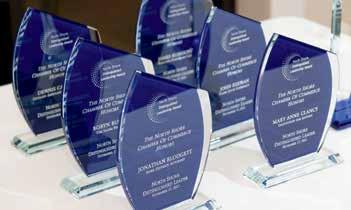
— Sonya Vartabedian, The Chamber
ESSEX DISTRICT ATTORNEY JONATHAN BLODGETT IS A DEDICATED SERVANT OF THE PEOPLE
You could say community involvement is in Jonathan Blodgett’s DNA, courtesy of his grandparents.
His grandmother was the first female visiting nurse in Peabody. His grandfather ran a small insurance office in the city and was involved in civic affairs, including the local Chamber of Commerce.
Early in his career as a lawyer, Blodgett served on the Peabody Parks Commission and later spent 16 years on the Planning Board. He went on to serve as chairman of the School Building Committee for two school projects in the city.
As a lifelong resident of Peabody, Blodgett says he has never considered community service a sacrifice. Nor has he sought attention for his work.
“Leadership is what you do when people aren’t watching,” he says. “Service just makes sense to me.”
They were watching when Blodgett was on the baseball field for Peabody High’s Tanners and later at Princeton University in New Jersey, where he was a three-time letterman. He firmly believed he would go on to play left field for the Red Sox.
But when a professional baseball career didn’t pan out, he decided to give law school a try. Married with young children, he enrolled in Suffolk Law School at night so he could keep his day job and support his family.
He began his legal career as an assistant district attorney in Essex County under Kevin Burke, before going on to spend 16 years as a partner in his own private law practice in Peabody Square.
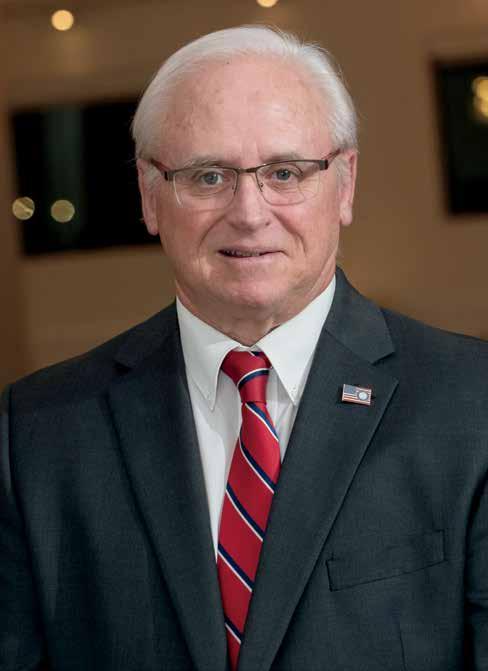
When Burke chose not to seek reelection, Blodgett ran for the district attorney’s office and won election in 2002.
He is now in his fifth term tackling a range of issues affecting the region, including the opioid epidemic, domestic violence, human trafficking, auto insurance fraud and gun violence.
Blodgett has been applauded for his commitment to approaching solutions through successful partnerships with the schools, the police and community leaders.
“As a district attorney, you have an absolute obligation to be a good listener,” he says. “You have to collaborate with other decision makers and people in authority. It’s not hard to do, but it’s essential to do.”
He hosts an annual school safety conference every year with the region’s police chiefs, first responders, superintendents and legislators to address issues of concern.
He meets with the county’s superintendents every October and works to fashion programs that will help the schools.
He instituted an adult drug diversion program in 2007, which has worked with 1,200 people in lieu of prosecution. He has expanded juvenile and youthful diversion programs, which have aided 20,000 young people during his tenure.
His office has also led efforts to better protect victims of domestic violence and hold batterers accountable.
“My statutory obligation as district attorney is to investigate and then prosecute, if it’s necessary, unattended deaths and homicides,” he says. “But we do so much more than that. We do our best to adapt and pivot.”
Blodgett says he cannot do his job in a vacuum. He says he’s made sure to surround himself with an outstanding professional team who provide him with unfiltered advice, which greatly contributes to his leadership. He is credited by his staff with always being willing to hear out the opinions of others, a quality that makes him appreciated by his team.
“Having good people around you makes you a better leader,” he says in response.
He continues to serve outside the district attorney’s office. He is the current chairman of the Board of the Addiction Policy Forum and is past president of the National District Attorneys

Courtesy photos Essex District Attorney Jonathan Blodgett, left, attends a graduation of the Breed All-Stars Program in Lynn, which teaches students about substance misuse, prevention and leadership.
Blodgett poses with Peg and Tom Ritzer at the Step Up for Colleen Road Race in Andover, held in memory of their daughter, a Danvers school teacher murdered by her student in 2013.
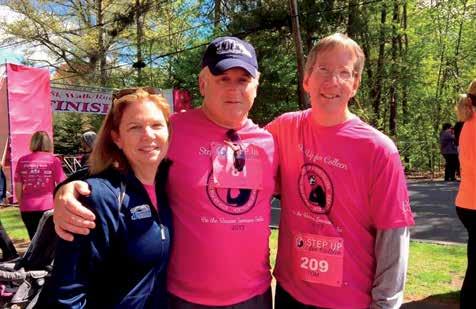
Association. He sits on the Board of the Massachusetts Office of Victim Assistance and has served on the board of the National Association of Drug Court Professionals.
Blodgett and his wife, Judy, have passed down their sense of commitment to community to their three grown children and now four grandchildren.
He advises young people to align themselves with a mentor, someone they can rely on to help them make better decisions in life.
“We’re all going to make mistakes,” he says. “But you’re going to cut down on the mistakes you make if you have someone you can trust.”
As district attorney, Blodgett says he is committed to holding criminals accountable, securing justice for victims of crimes, providing services and treatment to nonviolent offenders, and making Essex County a safer place to live.
“I try very hard to make a difference,” he says. “I really have the best job a lawyer can have. I get to help people every day.” I — Sonya Vartabedian, The Chamber
ROBYN BURNS DRIVES ACCESS TO FOOD TO CULTIVATE HEALTHY COMMUNITIES
Nearly 20 years ago, a friend asked Robyn Burns for a ride to his job at an organic farm in Pennsylvania. Quite unexpectedly, she found a career.
“I fell for it,” says the avowed foodie. “Working hands-on with food appealed to me.”
Burns, who had majored in film studies and communications in college, turned her focus to community food endeavors, whether addressing issues of food sustainability or food security.
Today, as executive director of The Salem Pantry, the Pennsylvania native continues to enjoy her work connecting food, community and education.
“Food is a powerful convener of people,” she says. “I have always been a cook myself. I enjoy preparing food. Personally, I like the connection of preparing food for family and friends.
“I realized I could have a meaningful career working to bring food to the marketplace or into people’s lives for consumption.”
Inspired by her experience on the organic farm, the University of Pittsburgh graduate enrolled in Slippery Rock University’s Sustainable Systems master’s program.
In 2006, she arrived in New England to become the North Shore urban agricultural manager at The Food Project. The organization brings together youths and adults from different backgrounds for the common good of community farming. After close to 10 years there, she says she was invested and committed to the nonprofit community food world.
By 2015, she had earned an executive certificate from Boston University in nonprofit management and leadership.
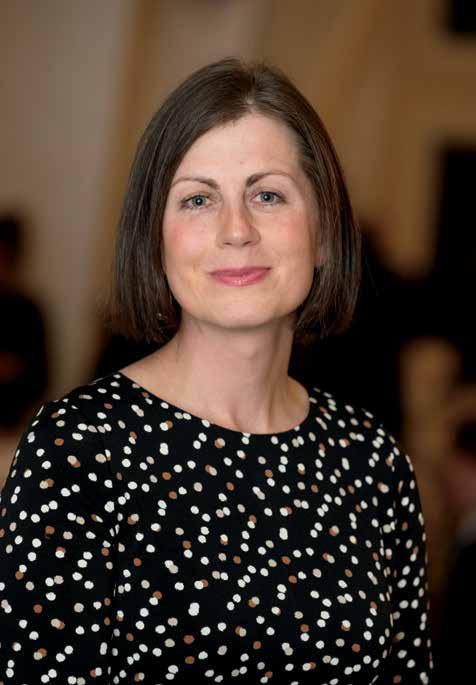

Courtesy photos The Salem Pantry Executive Director Robyn Burns aims to build community around food. ABOVE: The Salem Pantry has enjoyed the support of Salem Mayor Kim Driscoll, third from right. BELOW: Burns moves a pallet of eggs at the group’s warehouse in Shetland Park.
“This brought me deeper into the nonprofit world,” she says. “I learned I could stay true to community food while building leadership skills.”
Burns spent the next five years as director of programming for CitySprouts, where children learn to cultivate an interest in urban farming through active engagement.
In February 2020, Burns accepted the position as the first, full-time executive director of The Salem Pantry. The organization had just hired its first staff member a few months earlier, after operating for years as an all-volunteer organization.
Burns was scheduled to begin her new role that March — just as the world began shutting down in response to the global pandemic.
So, she and her team worked quickly and strategically to address the crisis. Almost overnight, The Salem Pantry transitioned from hosting one weekly market to 12 a week. She says her previous experience running food markets with various community partners helped guide her response.
From the start of the pandemic through this past July, The Salem Pantry distributed more than 1.25 million pounds of food through a mobile distribution program. More than 3,000 households and 10,000 individuals received groceries through their efforts.
But as importantly, Burns says, the pandemic brought the issue of food security to the forefront.
“Food security is very unique in that it’s sometimes hard to define. It’s almost invisible sometimes in society, and it’s a little different than our classic understanding of what hunger is,” she says. “There’s a real chronic need around food insecurity in our communities. It was here before COVID. It’s going to be here for some time.”
The chronic need for food is what Burns and her team are invested in for the long term.
A big piece of that, she says, is creating and maintaining partnerships and collaborations with other community organizations like Salem State University, which has hosted Salem Pantry mobile markets, and North Shore Community Development Coalition, which will provide a home for Salem Pantry’s first retail storefront in 2022.
She credits The Salem Pantry’s small staff — along with its dedicated Board of Directors, countless volunteers, and various city and public entities — for striving to find solutions and make a difference together.
“I like to think we have an open approach. We don’t have all the answers,” she says. “But we listen and adapt.”
What advice does she have for young professionals?
“Be a good listener, while not being afraid of making mistakes,” she says. “Be willing to take risks. Do not be afraid of using your own voice.”
Burns — who lives in Salem with her wife, Rachel Eisenberg, an elementary art teacher, and 10-year-old son — accepted the Distinguished Leader Award in the spirit of her grandfather, James Burns, who worked for the Department of Civil Defense in Washington, D.C., in the 1970s.
In addition to coordinating international food distribution to areas of need around the world, he worked to support a grassroots organization called So Others Might Eat (SOME) helping food-insecure people in the nation’s capital.
Burns hopes by continuing her grandfather’s work connecting people with food, she’s ultimately helping to strengthen the bonds that bring communities together. I — Ellen Small Davis, Impact contributor


A commitment to aid and to care
DENNIS CATALDO BELIEVES THERE IS NO CEILING ON WHAT ONE CAN ACCOMPLISH
Ask Dennis Cataldo when he became aware of his family’s ambulance business, and he will easily share strong memories of eating his fruity cereal each morning waiting for the telephone in their Malden kitchen to ring.
The call would mean someone needed an ambulance.
Looking over the rim of his cereal bowl, he would observe the mechanics of operating an ambulance company from his parents, Bob and Diana, who founded Somerville Ambulance in 1977.
Young Dennis was a quick study. He had a tabletop view as his parents grew their company from just two ambulances and three employees.
It was the beginning of his informal education as he learned the vernacular and nuances of the ambulance business.
“It’s a 24-hour business. My parents worked crazy hours,” Cataldo, who now lives in Lynnfield, says.
Ambulances became the backdrop of Cataldo’s childhood. He spent considerable time visiting the company’s Somerville headquarters. When he was off playing baseball, it wasn’t unusual for his father to arrive at his Little League games driving — that’s right — an ambulance.
By the time Cataldo was 14 and ready to enter Malden Catholic High School, he was washing the ambulances, filing paperwork and completing other tasks to help out and put a few dollars in his wallet. Eventually, he became second attendant on a wheelchair van, because he was still too young to drive.
Then, he experienced the health care industry from the perspective of a patient when he was diagnosed with Stage 4 Hodgkin’s Disease. He spent his
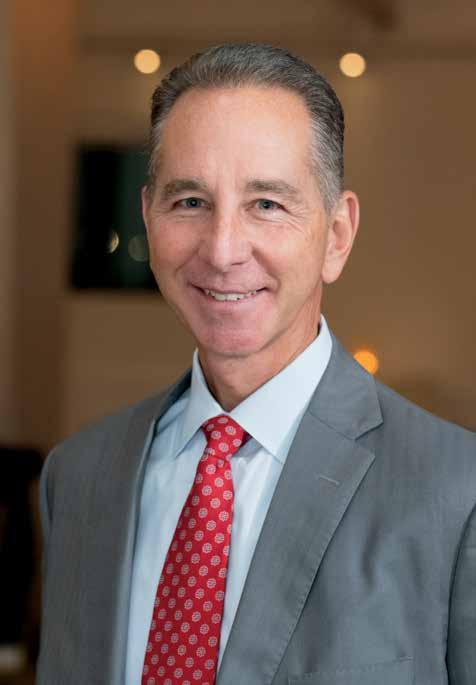
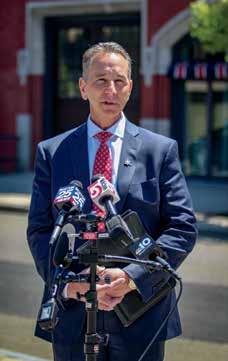
Cataldo Ambulance Service President and CEO Dennis Cataldo placed his company at the forefront of testing and vaccinations during the COVID-19 pandemic.
senior year of high school and freshman year at Suffolk University receiving radiation and chemotherapy.
With a compromised immune system, he was forced off the ambulance and into the office, where he became familiar with yet another aspect of the business — accounts receivable.
“Joining the military was the only other thing I briefly thought about doing. This was what I wanted to do,” he says today as president and chief executive officer of Cataldo Ambulance Service Inc.
“I was exposed so heavily to the business. I was always part of the conversation, even if I wasn’t a contributor. The entire time I was in college studying business management and marketing, I would think, ‘How can I apply this to make the company better ... more successful?’”
If success was his goal, Cataldo has achieved it.
Today, his breakfast of yogurt and a banana is healthier and more robust than it was years ago. So, for that matter, is Cataldo Ambulance, which has grown under his more than 30 years of leadership.
Cataldo has navigated the multi-million-dollar company through a number of business endeavors, including the
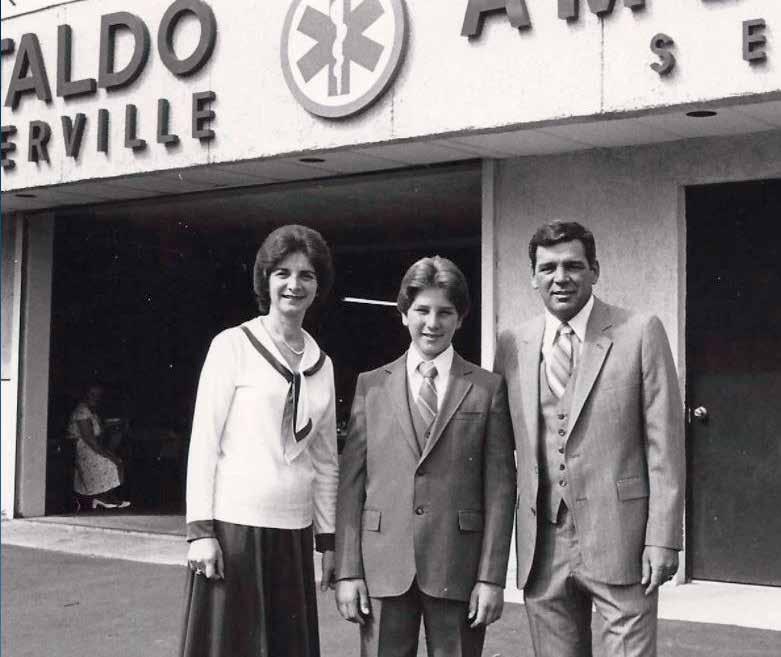
Courtesy photos A young Dennis Cataldo poses with his parents, Bob and Diana Cataldo, in front of the Somerville headquarters for the family’s ambulance business, which they founded in 1977.
acquisition of Atlantic Ambulance Service in 2003, Northshore Ambulance in 2008 and Lyons Ambulance in 2017. He also led the design and creation of SmartCare Mobile Healthcare, which proved to be a critical resource during the COVID-19 pandemic.
The company’s fleet of emergency vehicles has swelled to more than 200 today, and the combined staff of more than 800 employees serves over 160,000 patients each year from 21 communities.
During the pandemic, the company pitched in, adding 1,000 more workers to support testing for more than 2.5 million people and the vaccination of another 2.1 million individuals.
Cataldo is not content to rest on his accomplishments and is always striving toward innovation and the elevation of the role of emergency medical services. “Nobody should ever be satisfied that they have achieved all that they are capable of accomplishing,” he says. “A successful person understands that they can always accomplish more.”
By that measure, Cataldo has been as successful in the community as he has been within his company.
He has been heavily involved, for obvious reasons, with the American Cancer Society, serving in multiple leadership roles.
In 1993, he launched the annual “Swing for Hope” golf tournament which, to date, has raised more than $850,000 for the Cancer Society. In 2014, he was awarded the Cancer Society’s St. George National Award for outstanding volunteer service.
He is the current president of the Massachusetts Ambulance Association, a member of the Eastern Bank Board of Advisors, and a director and board member of several business groups, including the North Shore Chamber Board of Directors.
He and his wife, Christine, are the parents of triplet boys, who are seniors in high school.
In accepting his Distinguished Leader Award, Cataldo referenced the words “innovative” and “caring” in describing what a true leader can be, particularly during the recent trying times.
“It’s not about what you take with you,” he said in closing, “it’s what you leave behind.” I
— Ellen Small Davis, Impact contributor
MARY ANNE CLANCY BELIEVES SUCCESS COMES WHEN YOU DO WHAT YOU LOVE
Service has been at the forefront of every facet of Mary Anne Clancy’s diverse career.
Whether serving as mayor, marketing professional, activist, volunteer or in her current role as senior vice president at the Institution for Savings, Clancy is driven by a conviction to make her community of Newburyport and the North Shore a better place to live and work.
Clancy’s father was a 40-year educator in the Newburyport public schools, including serving more than two decades as superintendent. Her mother led their family of six children. Clancy would naturally embrace their dedication to kindness, compassion, family and service.
An idealist by nature, Clancy found herself working on the Students for Kennedy presidential campaign while at the University of New Hampshire, where she began cultivating political contacts.
By the time she earned her degrees in communications and political science, she was living in Washington, D.C., and working for the late U.S. Sen. Paul Tsongas until he declined to seek re-election.
Her years with Tsongas left an indelible mark. He taught her the importance of being “the voice for people who don’t have voices” and “to fight for what is right and what is good in the world.”
Tsongas also instilled in her what he called the “obligation of survival.”
“He believed we all have an obligation to leave this world better than when we came into it,” she says, “and I hope that I live that all the time.”
Clancy returned to the Bay State after Tsongas left office, working first for
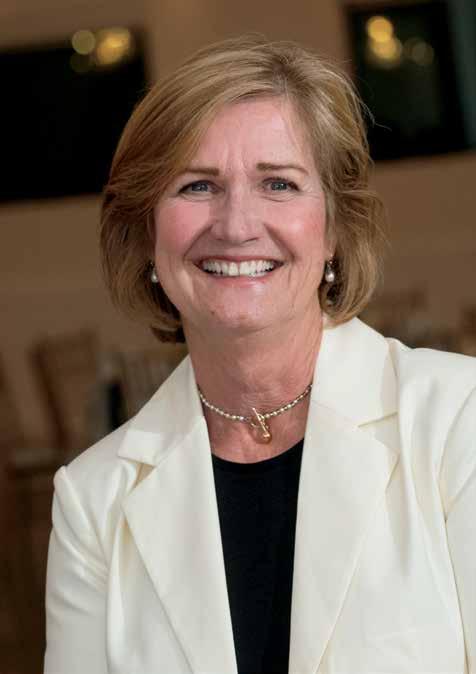
Mullen Public Relations and then as an assistant to Massachusetts Secretary of Energy Sharon Pollard.
Then, while her three children were young, she turned her attention to marketing — as an assistant vice president for First & Ocean National Bank and then as the head of her own freelance company.
It was during this time that Clancy entered local politics, serving for 10 years on the elected Newburyport School Committee.
In 2004, she made the leap to City Hall as the mayor of Newburyport for one, two-year term. She is credited with launching Newburyport Youth Services, which continues to offer recreational opportunities and programs that promote personal empowerment.
She returned to marketing after leaving the mayor’s office, joining the Institution for Savings in 2006.
Today, she is the bank’s senior vice president of marketing and communications — overseeing its advertising, media outreach, customer communications and promotions.
Not unlike politics, she says, the Institution for Savings “has a vision to have a positive effect on the lives of individuals as well as the community.”
One such vision was of her own design — the bank’s financial literacy program, which offers high school students school credit following the completion of an online program that challenges them to create and live within an imagined budget.
The program has been so successful it attracted the attention and participation of eight Massachusetts banks. She has also collaborated with Massachusetts legislators to make financial education mandatory in public schools.
Clancy is omnipresent in the greater Newburyport community. She is the chair of the board of the Firehouse Center for the Arts in Newburyport and a commissioner on the Essex National Heritage Commission.
She is a founding board member of the Newburyport Education Foundation and on the board of the Putnam Free School. She led the Restore World War Memorial Stadium campaign in the city, seeing its work to completion in 2015.
She is a former corporator and board member of the Anna Jaques Community Health Foundation in Newburyport.
Clancy serves on the Board of Directors of the North Shore Chamber and is a founding co-chair of the new THRIVE
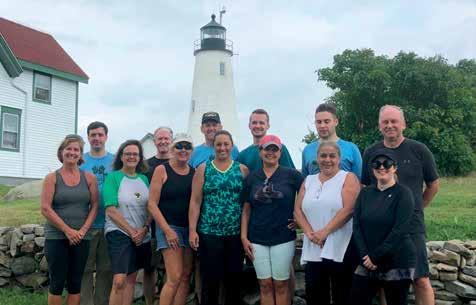
Courtesy photos Institution for Savings Senior Vice President Mary Anne Clancy, left, lends a hand to numerous causes, including volunteering to clean up the trail at Bakers Island in Salem.
Clancy, second from left, gets ready to tee off for the Play for P.I.N.K. Golf Tournament. She’s been an ardent supporter of breast cancer fundraisers through the years.
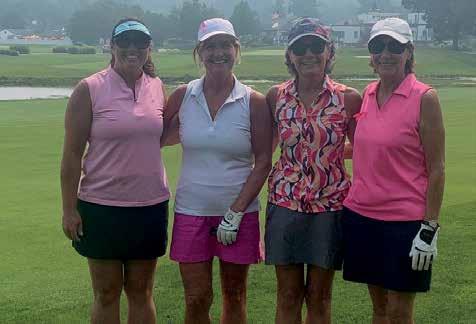
initiative dedicated to empowering business women to succeed both professionally and personally. She also sits on the board of the Greater Newburyport Chamber of Commerce & Industry.
Throughout her professional and volunteer careers, Clancy says she has learned the value of being a good listener and supporter
“You need to listen while leading. Listen to what people say. Weigh all opinions and be an empathetic leader,” she says.
“Bolster people up. Make everyone around you better by empowering them. Trust people around you to do their jobs and then reward them, even if it’s just with a few kind words.”
Clancy is a true believer that success naturally follows when you are doing what you love.
She advises young professionals to advocate for themselves “because no one else will,” get involved in the community where you live or work, and “volunteer in whatever way makes you happy.”
She also emphasizes the importance of relationships.
“You don’t get to be a leader unless you have somebody walking next to you; people walking behind you, pushing you sometimes; and people walking in front of you helping you,” she says.
“Leadership is a team sport, and I have the greatest team ever.” I — Ellen Small Davis, Impact contributor
‘Try hard, be polite and don’t be afraid to fail’
SALEM STATE PRESIDENT JOHN KEENAN LIVES BY THE VALUES HE INSTILLS IN OTHERS
John Keenan has always made his desire to give back together with his lifelong pride for his hometown of Salem the cornerstone of his career.
Among the first generation of his family to go to college, Keenan is now combining both passions as he leads Salem State University as its 14th president.
It’s not a role he ever intended to fill. But he considers the opportunity to provide students with the tools to pursue their dreams and realize their potential the capstone of a very rewarding professional life.
“I’ve had a series of jobs that I think anyone wanting to be in public service would dream of,” he says.
While Keenan’s parents were not able to go to college, they instilled the value of an education and giving back to the community in their three children. Keenan and his older brother and sister not only earned their undergraduate degrees, but also completed graduate school.
Keenan graduated from Harvard University and later obtained his law degree from Suffolk University in Boston after realizing early careers in banking and sales were not a good fit.
Following law school, he worked as an assistant district attorney in Essex County and was a member of that office’s first Domestic Violence Unit. He then served as city solicitor for Salem through two administrations, from 1996 to 2004.
From there, Keenan entered state politics — representing the Seventh Essex District as state representative from 2005 to 2014.
He was a leading proponent of gaining university status for Salem State in 2010. He also championed social justice
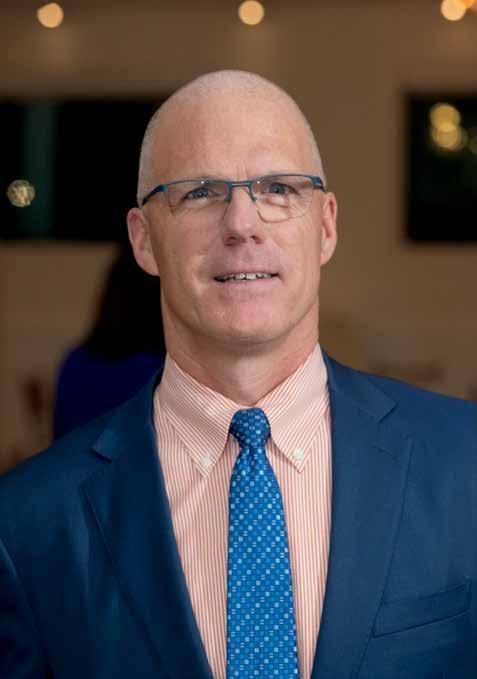
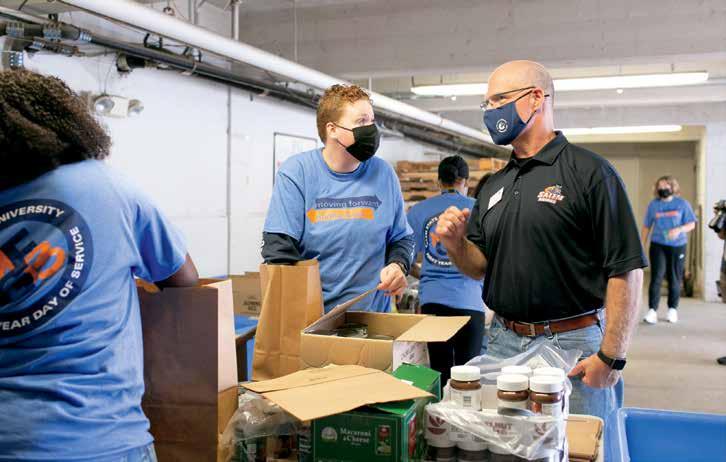
Salem State University President John Keenan checks in on volunteers participating in the school’s “First Year Day of Service” program, where they assembled food kits at The Salem Pantry. “We do expect all of our students to give back to their community,” Keenan says.
issues, voting to preserve marriage equality, address schoolyard bullying and protect transgender employees in the workplace. While the bill ultimately did not pass, one of his proudest votes was in support of the DREAM Act, to provide in-state tuition for undocumented students.
Keenan arrived at Salem State in 2014 as its general counsel and vice president for administration. Three years later, he was named its president.
By all accounts, it’s been a successful career. But Keenan says it’s not been void of setbacks and obstacles along the way.
In high school, he says, he lost all 11 matches his first year on the wrestling team, including being pinned in 19 seconds in his first competition. By senior year, he was undefeated on the mat in regular matches.
Later, he was twice defeated in his early attempts at public office before being elected to the Legislature.
The word “failure,” however, is not in Keenan’s vocabulary. He prefers to view humbling experiences as learning opportunities that make him stronger.
“I try to speak with students about not being afraid to fail,” he says. “Being able to take a risk helps you grow, whether you’re in high school, college or your professional career.”
There are two rules in the Keenan household: Try your hardest and be polite. Keenan and his wife, Kara McLaughlin, stress both values with their two children. They’ve also served him well professionally, he says.
Keenan is a proponent of leading by example and living by your values — two qualities he saw in many of his own role models, including the late Judges David Doyle and Samuel Zoll.
“I don’t just talk about that,” he says. “It’s how I’ve spent my life.”
He believes successful leaders are those who know how to surround themselves with people more talented and smarter than they are.
“I’m very rarely the smartest person in the room, and I appreciate that,” he says.
Being a leader also means making decisions without having all the information one might like.
“Review the best information available at the time, be decisive about it and move on,” he advises young professionals. “Have no regrets about it.”
A lifelong Salem resident whose family history in the city dates to the Salem Witch Trials, Keenan also encourages his students to be actively engaged in their communities.
Keenan sets an example as vice president of The Salem Partnership and as a director of the North Shore Chamber. He is also on the board of the Salem Award Foundation for Human Rights & Social Justice and on the North Shore Advisory Committee of the Anti-Defamation League.
Inspired by his mother, who passed away from lung cancer at the age of 56, Keenan also participated in the PanMass Challenge for 26 years, raising over $160,000 for the Dana-Farber Cancer Institute.
Keenan says it’s the honor of his life to be leading Salem State, which he calls “the great equalizer” because it provides a trajectory for success to anyone who chooses to further their education.
“Find what you enjoy doing and it’s not like going to work,” he says. “I truly love what I do.” I — Sonya Vartabedian, The Chamber
JAMES RUDOLPH HAS MADE SERVICE AN ESSENTIAL PART OF HIS LAW CAREER
Jim Rudolph borrows from Sir Winston Churchill’s words when he reflects on his career. “You make a living by what you get,” Rudolph says in quoting the British statesman. “But you can make a difference by what you give.”
All through his life, Rudolph has supported causes and organizations he believes in — from his alma mater, The Governor’s Academy in Byfield, of which he is board vice president; to the Massachusetts Commission Against Discrimination and the Anti-Defamation League.
“What I do is not just practice law,” he says. “I do look to be involved and give back.
“I tell people starting out to get involved in something that you’re passionate about and commit to it and assume a leadership role, if possible. You will get a lot of pleasure in doing it. It’s worked out well for me.”
It was a business law class in college at the University of Denver in Colorado that led Rudolph to decide to explore the legal profession.
The Beverly native went on to graduate from Boston College Law School and joined the firm where he started his career soon after graduating.
Today, Rudolph Friedmann LLP is a full-service business law firm with 18 attorneys, having offices in Boston and Marblehead.
Rudolph and his partners have been leading the firm together for over 30 years. The office has expertise in real estate law, construction law, business litigation and all types of corporate and business matters.
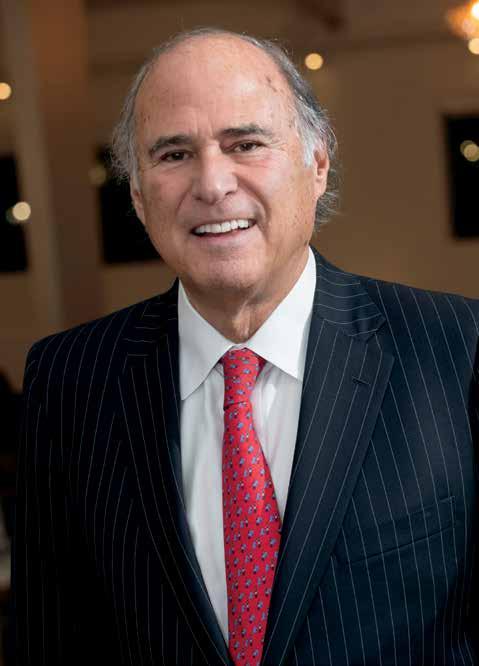
Rudolph originally focused his own career on litigation, before turning his attention to business law, real estate law and construction law. He regularly assists in the purchase and sale of businesses and the resolution of business disputes.
More than four decades later, he hasn’t lost the desire to take on new cases or the ability to stand out in his profession. He was recently named to the 2022 edition of The Best Lawyers in America for real estate law and construction law. This year, he was also named by Lawyers Weekly as a Go To Lawyer for business.
“Every day is different,” he says. “I like the stimulation of having different challenges daily and meeting different people and helping them solve their problems if I can.”
Rudolph believes a good leader must be a strong communicator, while at the same time being open to ideas from others. He also sees great value in being a mentor to younger professionals.
“You have to have a vision of what you want to accomplish,” he says. “You have to try to be a good mentor and motivate and encourage other people as well.”
Rudolph has served on countless business, legal and community organizations over the years, and remains on eight boards today.
He learned early on from his father and grandfathers to be proud of his Jewish heritage. As a result, he has directed some of his volunteer efforts to the Jewish community as well as civil rights and social justice causes.
He spent several years as chairman of the New England Regional Board of the Anti-Defamation League, and he is currently co-chair of the ADL’s Board of Overseers. He was very involved as a board member and president of the Jewish Rehabilitation Center for the Aged of the North Shore.
In addition, he is a past president and board member of the Associated Builders and Contractors and is also on the board of the Massachusetts Restaurant Association and the Board of Directors of the North Shore Chamber of Commerce.
He was appointed by Gov. Charlie Baker to the Advisory Board of the Massachusetts Commission Against Discrimination.
He has been a corporator, trustee and director of several Boston-area banks and currently sits on the Advisory Board
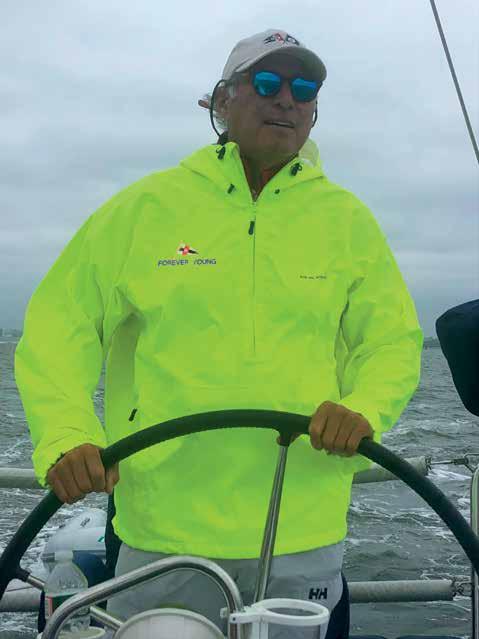
Courtesy photo Attorney James Rudolph is seen at the wheel of his sailboat, Forever Young. Sailing is one of his favorite pastimes when he’s not at work or busy with his volunteer commitments.
of Eastern Bank. He is also on the board of the Eastern Bank Charitable Foundation, which last year awarded close to $20 million in grants.
Rudolph has also been involved in local government, serving as a selectman in Swampscott for three terms and on the Zoning Board of Appeals in both Swampscott and Marblehead.
Rudolph and his wife, Susan, raised their three children in Swampscott, before moving to Marblehead 10 years ago.
Both of Rudolph’s sons have become lawyers, including one who is a partner at Rudolph Friedmann LLP. His daughter is a physician assistant.
Rudolph says he is getting to an age where he is seeing some of his contemporaries retire. While he has tried to pull back on some of his community involvements, he says he’s nowhere near ready for retirement.
He has, however, made more time in recent years to pursue his hobbies. He has owned a sailboat since he was a boy, is an avid skier, plays golf and enjoys time with his two grandchildren.
Perhaps the name of his boat, Forever Young, explains it best. He still wakes up every day wanting to continue making a difference and intends to do so as long as he is able. I — Sonya Vartabedian, The Chamber



